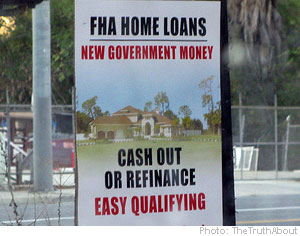 When Gregg Easterbrook writes about something I know about, he almost always gets his facts wrong.
When Gregg Easterbrook writes about something I know about, he almost always gets his facts wrong.
In his football column (which I like), he writes:
A generation ago — a decade ago! — home buyers were expected to have a 20 percent down payment; that made them unlikely to try to buy something they could not afford, and banks wouldn’t be exposed if something went wrong, since they were lending only 80 percent of the value of the property. Now requiring 3.5 percent down is viewed as “toughening” standards. Isn’t this an invitation for yet another cycle of mortgage problems?
Low down payments for FHA loans have been around for awhile. When President Eisenhower signed the 1957 housing bill, Time Magazine reported:
The Federal Housing Administration, aiming to attract money for homebuilding, increased maximum interest rates on FHA-backed mortgages from 5% to 5¼%. And to woo more buyers from middle—and even low —income groups, it slashed down-payment requirements from 5% on the first $9,000 to 3% on the first $10,000 of a mortgage.
Yes, one could buy a house for $10K in 1957. A brand new 3-bedroom in Mansfield Ohio cost $15k at the time, so used homes would have cost less.
Buyers have also been able to use private mortgage insurance to buy houses with five percent down-payments for many years (at least since the 1980s–if any one has history on PMI down-payments before that, I would love to hear about it). VA loans have always had very low down payment requirements.
Do I worry about FHA? Sure. But let’s not pretend that we lived in some virtuous world before this decade in which everyone put 20 percent down on their house. It was just not true.
- Bulenox: Get 45% to 91% OFF ... Use Discount Code: UNO
- Risk Our Money Not Yours | Get 50% to 90% OFF ... Use Discount Code: MMBVBKSM
Disclaimer: This page contains affiliate links. If you choose to make a purchase after clicking a link, we may receive a commission at no additional cost to you. Thank you for your support!



15K for a house? That really shows how much value the dollar lost. But then again you can get a house in Michigan for about 100 dollars.